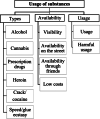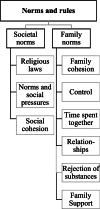Escaping the past and living in the present: a qualitative exploration of substance use among Syrian male refugees in Germany
- PMID: 33845859
- PMCID: PMC8042941
- DOI: 10.1186/s13031-021-00352-x
Escaping the past and living in the present: a qualitative exploration of substance use among Syrian male refugees in Germany
Abstract
Background: Syrians have been the largest group of refugees in Germany since 2014. Little is known about Syrian refugees` perspectives on substance use. The aim of this study is to investigate the perspective of male refugees from Syria and to foster specific knowledge and understanding of substance use.
Methods: We applied a qualitative study design. Five semi-structured focus group discussions with a total of 19 refugees were conducted in 2019 among the difficult to reach population of Syrian refugees. Audio recordings were translated and transcribed. We used a hybrid approach by integrating inductive and deductive thematic frameworks.
Results: We identified common themes. Firstly, refugees perceived that substances are widely available and accepted in Germany. Secondly, refugees perceived that rules and norms in Germany differ from rules and norms in the home country and favor availability of substances. Thirdly, substance use is related to the intention to escape the past. Fourthly, substance use is related to living in the present through connecting with others and being part of the community. Finally, mental health professional treatment for substance use is associated with shame.
Conclusions: Findings support Syrian refugees` perspectives of substance use as a way of both escaping the past and coping with psychosocial difficulties in the present in a socio-ecological understanding. Understanding the explanatory model of Syrian refugees can inform future interventions to prevent substance abuse and design tailored interventions. Further studies with Syrian refugees in more countries are needed to better understand resettled refugees` perspectives on substance use.
Keywords: Escape; Mental health; Qualitative research; Refugee populations; Substance use; Syria; Trauma.
Conflict of interest statement
Authors declare that they have no conflicts of interest.
Figures
References
-
- de Graaff AM, Cuijpers P, Acarturk C, Bryant R, Burchert S, Fuhr DC, Huizink AC, de Jong J, Kieft B, Knaevelsrud C, McDaid D, Morina N, Park AL, Uppendahl J, Ventevogel P, Whitney C, Wiedemann N, Woodward A, Sijbrandij M. Effectiveness of a peer-refugee delivered psychological intervention to reduce psychological distress among adult Syrian refugees in the Netherlands: study protocol. Eur J Psychotraumatol. 2020;11(1):1694347. doi: 10.1080/20008198.2019.1694347. - DOI - PMC - PubMed
-
- Acarturk C, Mc Grath M, Roberst B, Ilkkursun Z, Cuijpers P, Sijbrandij M, Sondorp E, Ventevogel P, McKee M, Fuhr D. Prevalence and predictors of common mental disorders among Syrian refugees in Istanbul, Turkey: a cross-sectional study. Soc Psychiatry Psychiatr Epidemiol. 2021;(56):475-84. - PubMed
Grants and funding
LinkOut - more resources
Full Text Sources
Other Literature Sources
Miscellaneous




